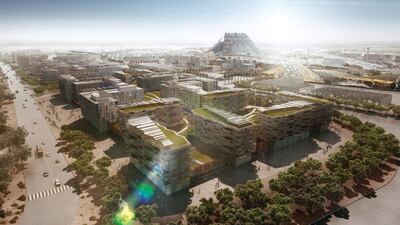A roadside banner bearing the logo of Dubai's World Expo 2020 bid is the only sign that a dusty expanse of desert on the edge of the emirate stands to become a future focal point for development.
If Dubai gets the nod on November 27 to host the event, the 438-hectare site in Jebel Ali will be transformed into a futuristic-looking exhibition space, focused around the theme, “Connecting Minds, Creating the Future”.
Officials estimate staging the fair would boost the economy by US$23 billion, equivalent to about 24.4 per cent of GDP, across 2015 to 2021. Bank of America Merrill Lynch (BAML) says the event would likely translate into a two percentage points lift to GDP between 2020 and 2021.
It would also help cement Dubai's claim as a global destination for tourism and business. The authorities forecast the expo would attract 25 million visitors over six months, while creating 277,000 jobs.
“Hosting the expo will likely have a positive impact on Dubai’s growth by accelerating infrastructure investment ahead of the event as well as boosting tourism and trade during the event and, hopefully, afterwards as well,” says Khatija Haque, a senior economist at Emirates NBD.
Among the projects slated to be fast-tracked will be the Dh5bn extension to the Dubai Metro’s Red Line, which will run from the existing terminal at Jebel Ali to Al Maktoum International Airport, next to the expo site. A further Dh21bn will be set aside by the Dubai Government for capital spending.
Officials have given little indication so far of how they plan to cover the costs.
But funding is likely to have to come mainly from borrowing.
“We believe that Dubai’s Government is likely to finance the Expo through a mix of bond issue, bank borrowing and cash raised from asset disposals and profits from Dubai Inc businesses,” wrote analysts at EFG Hermes, an Egyptian investment bank, in a report released last month.
The prospect of Dubai piling up fresh debt has raised worries among some analysts. The emirate and its companies already have $60bn of liabilities due by 2017, according to the IMF.
Investors have painful memories of four years ago this month when the emirate's flagship conglomerate Dubai World roiled global markets by requesting to delay US$25bn in debt payments.
Since then good progress in debt refinancing by some of the emirate’s companies have helped to pare down Dubai’s credit risk.
“The high external borrowing needs [as a result of Expo 2020] could increase Dubai’s borrowing costs given a crowded Dubai maturity schedule and still elevated leverage,” says Jean-Michel Saliba, BAML’s economist covering eastern Europe, the Middle East and Africa.
Dubai is expected to net about US$1.7 billion in ticket sales and sponsorship. There is also the wider benefit to the wider economy from more tourists, higher consumption and job creation.
Sheikh Ahmed bin Saeed Al Maktoum, the head of Dubai’s Supreme Fiscal Council and its Expo committee, said in September the “benefit will outweigh the cost of hosting the event”.
The private sector is likely to help shoulder some of the financial costs too, and share some of the returns.
Banking growth could be boosted by an annual 1 per cent between now and 2020 as a result of new funding opportunities, estimates Jaap Meijer, the executive director of equity research at Arqaam Capital. Construction companies, airlines, shops and hotels are also likely to be major beneficiaries.
Patrick Gaffney, an analyst at HSBC in Riyadh, estimates a further Dh31bn will be raised through debt and equity from private companies building hotels. He says 45,000 new hotel rooms will be required between now and 2020, some of which are already hitting the market. Demand will be fuelled by an estimated 70 per cent of the visitors coming from abroad.
While Dubai already boasts a plethora of hotels, few are close to the expo site. Demand will be further fuelled by the development of the neighbouring Al Maktoum International Airport, which is planned to eventually cater for up to 160 million visitors a year.
But concerns have been raised about how the hotel rooms will be filled once the expo crowds depart. As an example, HSBC notes how hotel occupancy in South Africa fell from 84 per cent during its 2010 Fifa World Cup football championship to 55 per cent a year later because of fewer visitors and excess supply.
“The risk is that occupancy goes up during the event but then it falls right after but that does not mean it stays at that level,” says Mr Gaffney.
“A lot depends on the economy in 2020.”
There are also broader risks in the property market from pushing through too many schemes at too fast a pace.
In a report in July, the IMF raised worries about a glut of planned mega-projects hitting the market but said Dubai officials had given assurances they would be rolled out gradually.
Apartment prices have already risen more than 20 per cent so far this year. In a bid to minimise the chances of a bubble forming, authorities have announced several initiatives designed to take heat out of the property market here including capping mortgage levels for property buyers and, in Dubai, doubling to 4 per cent the registration fee charged on land sales.
If the delivery of the expo can be managed with similar care, the expanse of desert on the edge of Dubai will become the next focal point for the city, both during the event and for decades after.
tarnold@thenational.ae

